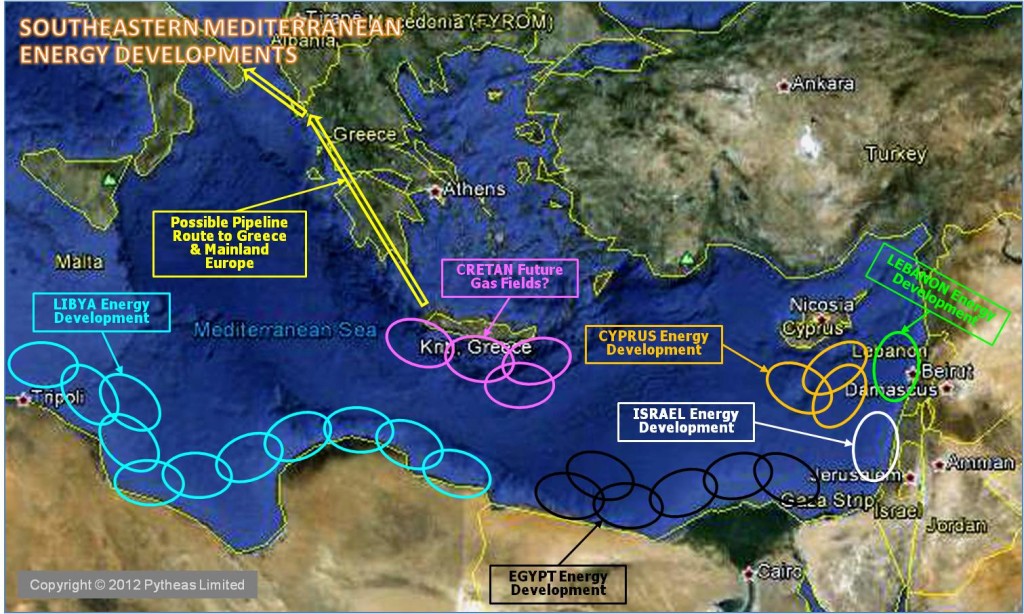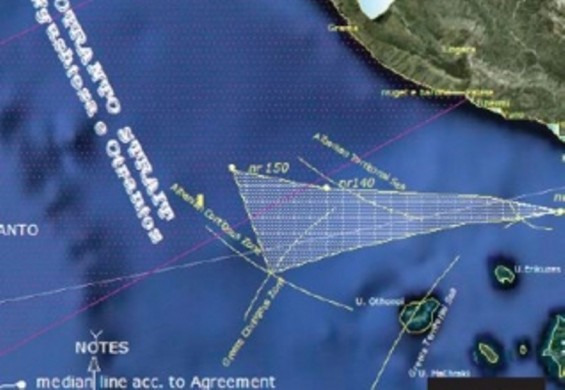 A debate has been triggered in Albania over the pending agreement over the sea borders with Greece and the search for oil that the Greek side has started in the Ionian Sea. Albanian media published a map claiming that it was published by the ministry of Energy of Greece, which suggested tenders for oil exploration even in the areas for which the agreement between Albania and Greece on the sea border was annulled. The reaction of the Greek government was prompt, saying that it’s cautious with the steps that it’s taking.
A debate has been triggered in Albania over the pending agreement over the sea borders with Greece and the search for oil that the Greek side has started in the Ionian Sea. Albanian media published a map claiming that it was published by the ministry of Energy of Greece, which suggested tenders for oil exploration even in the areas for which the agreement between Albania and Greece on the sea border was annulled. The reaction of the Greek government was prompt, saying that it’s cautious with the steps that it’s taking.
Greece, 20 areas where oil is being explored
Greece has offered 20 areas to be explored for oil and gas in its seas. According to the Greek ministry of Energy, there are 225.000 square kilometers divided into 20 quadrants and which are currently under a tendering process. There are 20 international oil companies which have passed the final stage of selection. Among them is “BP”, “Exon Mmobil”, “Chevron”, “Stat Oil”, etc.
The Greek side is optimistic about the exploration made so far. According to it, there are clear signs that in many areas which will be tendered, there are big oil reserves. The optimism of the Greek side is even bigger about the fact that large gas reserves have been found in the southern part, near Cyprus.
The deputy minister who is responsible for Energy Issues in the Greek government, Janis Manjatis, says that Greece hides under its ground large quantities of oil and gas. These reserves are estimated to bring 20 billion Euro worth of profits to Greece in the next 20 years and at the same time, they turn the country into one of the biggest oil and gas producers in the region.
As far as oil explorations are concerned, media in Albania published a map showing that these explorations are also taking place in the Ionian Sea.
“What catches the eye in the map published by the Greek ministry of Energy is the fact that quadrant no. 1 and a part of quadrant 2 are in the much debatable area between Greece and Albania. This area, based on the old sea borders and which are still in force, are part of the exclusive economic area of Albania, but with the pact signed between Berisha’s government, they are given to Greece”, Albanian media reported yesterday. The agreement was signed by ‘Berisha’ government and Karamanlis for the Greek side, but it was quashed by the Albanian Constitutional Court.
Oil exploration, Greece: We will not cause problems with Albania
As far as the publication in many media in Tirana is concerned, the spokesman of the Foreign Ministry of Greece, Mr. Konstantinos Koutras has reacted.
He commented declarations according to which, areas which will be tendered by the Greek government for exploration and exploitation of oil and natural gas, also expand within the Albanian territorial waters.
Mr. Koutras denied such thing: “Greece fully respects International Law on the Sea. We have been careful not to create any problems with any of the neighboring country, namely Albania, with the areas which will be tendered. Of course, our framework of referral is joint acceptance and compliance with the International Law on the Sea”.
Andrea Stefani: Greeks are asking “Rama” government to commit political suicide
Prominent Albanian analyst, Andrea Stefani sees this as Athens’ effort to put an end to the issue of the sea borders and says that if Edi Rama’s government signs it with the previous terms, it would be political suicide
Stefani says that when Rama was in opposition, he considered the pact signed by Berisha as national treason. “If the Albanian government sings the pact for the sea waters with Greece based on the terms of the agreement signed by Sali Berisha government, such thing would be political suicide for the government of Edi Rama, which, when it was in opposition, it considered such agreement as treason to national interests”.
Stefani also recalls the fact that when Rama was in opposition, “he sent the agreement between Berisha and Greece to the Constitutional Court, which quashed it”.
“Even now, the government has demanded to the prosecution to investigate law violations committed by negotiators of the agreement in question”.
In this point, Stefani launches criticism about the way how the Greek Foreign minister is trying to unblock the situation.
“Venizelos has demanded to Rama to sign today what he considered as national treason yesterday! In other words, to commit an anti-national act. He’s also telling him to respect an agreement that the Constitutional Court has quashed! In other words, to act in the anti-European spirit by going against a court ruling! And all of this, under the gentle pressure that Greece will not vote in favor of the opening of negotiations”.
Prosecution hasn’t started any investigations
General Prosecution has not started any investigations over the agreement on sea borders signed with Greece in 2009.
Foreign Minister, Ditmir Bushati sent information relating to this agreement to the prosecution at the end of April, where he demanded an inquiry to be launched, also based on the decision of the Constitutional Court which quashed it.
General Attorney, Adriatik Llalla asked to the Foreign Ministry to send these documents and he asked it to send it in the form of criminal charges.
Sources from the prosecution said that Bushati’s materials were in the form of information and not criminal charges.
“The materials that arrived from the Foreign Ministry were not complete. The information stated that the signatories, without mentioning names, had violated two articles of the Criminal Code, namely article 208 and 210, which relate to the ‘surrendering of territory’ and ‘the agreement to surrender the territory’”, report sources from the Prosecution. The document signed by Bushati also quoted the ruling of the Constitutional Court, which quashed the agreement.
According to Bushati, besides the overthrow of the sea agreement by the Constitutional Court, the work group appointed by the Foreign Ministry has also identified several violations during the negotiations with Greek authorities. Bushati said that the prosecution must investigate if article 210 of the Criminal Code has been violated or not. This article leads to 5 to 10 years prison sentence for “agreements made with foreign states for partial or complete surrender of territories”.
“As far as the signatories of the agreement are concerned, I believe that the General Attorney has all the necessary documents, the ruling of the Constitutional Court, the international practice, which is considered to be violated by this court. He can also refer to the Criminal Code. As far as the people involved in the agreement is concerned, the necessary measures will be taken, while as far as the signatories are concerned, I will wait on the decision of the prosecution”, declared Bushati.
Two months have gone by since these declarations were made and which gave way to silence.
The agreement on sea borders with Greece was signed in 2009 in Tirana, in the presence of the two prime ministers, Berisha and Karamanlis, by the two foreign ministers, Lulzim Basha and Dora Bakojanis.


